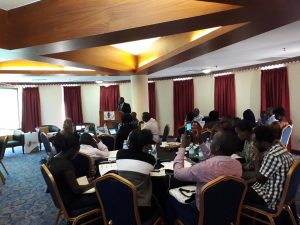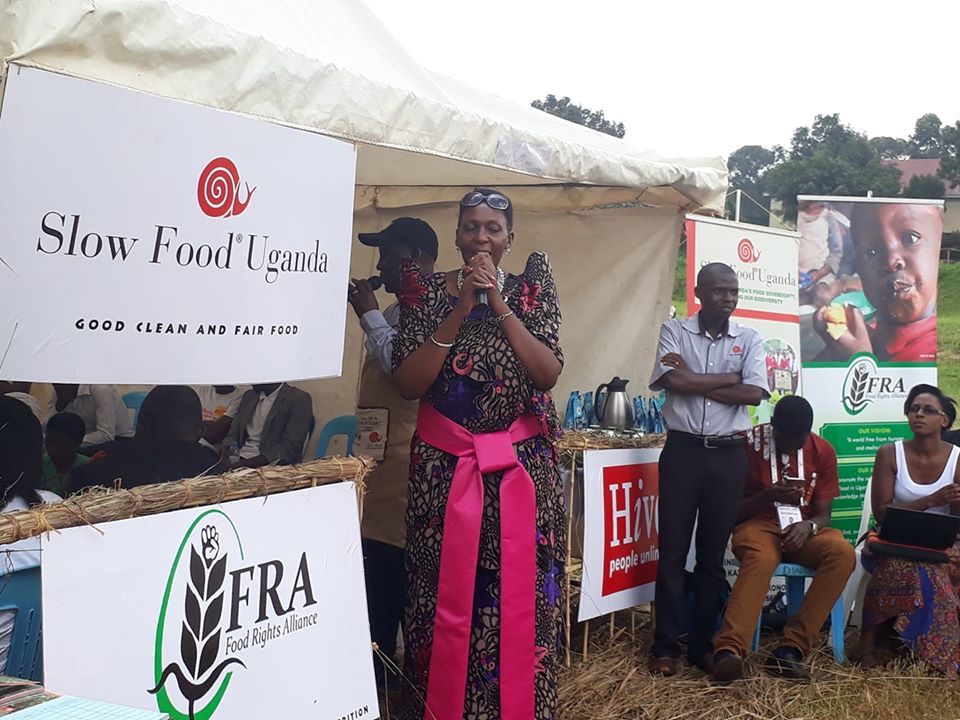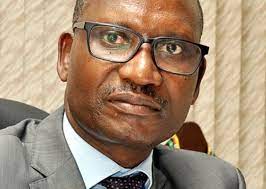TRANSPARENCY: CoST Uganda Commissions 2nd Infrastructure Transparency Index
BY PATRICK JARAMOGI
KAMPALA, Uganda: The sorry state of food and nutrition security in Uganda is not due to the absence of resources or food, but rather an issue of organization and planning. Despite various interventions, financial investments, global and continental commitments, and natural endowment, the number of hungry and malnourished people commensurately grows year after year.
According to the Integrated Food Security Phase Classification (IPC), 2017, 10.9Million Ugandans were experiencing acute food insecurity and 1.6million were in a food crisis situation projected to have reached 11.4 million by March 2017. However, food and adequate diets are neither a discussion issue nor a value in the public domain although there are episodes in the most recent past of consumer vigilance over the safety of food sold and consumed, a case of beef and dairy products. However, this conversation and debate has never been sustained due to a lack of momentum and the lack of interconnectedness of interventions by actors.

Mr. Derrick Mugisha Country team leader- Uganda Youth Biodiversity Network says that being part of the Sustainable Diets for All Advocacy Programme in Uganda, Food Rights Alliance has worked closely with her fellow partners to integrate the promotion, protection, and preservation of indigenous food systems in the agriculture sector strategic planning and investment framework as a measure of promoting sustainable diets for all.
“As conveners at the national level, FRA works to leverage information from her fellow SD4All partners to influence, define, reshape and reconstruct a new National strategic investment framework (Agriculture Sector Strategic Plan – ASSP) FY 2020/21 – FY 2023/24 by the Ministry of Agriculture that plans for responsive food systems to the emerging food and nutrition needs of the country,” said Mugisha.
Hivos, a Dutch-based organisation with support from the Kingdom of The Netherlands generated funds to support the implementation of the sustainable diets for all in the four districts in Uganda: (Gulu, Buikwe, Kabarole, and Kampala (National Secretariat)
Hivos East Africa has been so instrumental in supporting the Front Runners such as Food Rights Alliance, VEDCO, Slow Food Uganda (below), and the Kabarole Research Center (KRC) to influence government and the various stakeholders engaged in policy and advocacy to champion issues related to increasing awareness on the importance of proper health, better nutrition, the element of green and environmental conservation, among others.
The SD4ALL Programme, a 5 year (2016-2020) advocacy programme was introduced to enable low- income communities to improve their access to sustainable, diverse, and nutritious food. The overall strategic goal was “to work with citizens and partner organisations to influence policies, market practices, government actors, and institutions to promote diets which are diverse, healthy, fair, and green.
In Uganda, Hivos East Africa has been working in partnership with Volunteer Efforts for Development Concerns (VEDCO) based in Gulu, in northern Uganda, Slow Food Uganda, based in Buikwe district, Food Rights Alliance based at the National Secretariat in Kampala, and the Kabarole Research Center (KRC), based in Kabarole (Fort-Portal) to influence government and various stakeholders through lobby and advocacy.
Hivos East Africa has patterned, with and brought together all the key actors in the food system, such as farmers, transporters, Market Vendors and the consumers, as well as elected district leaders and local government technocrats in a round table discussion and training to raise issues, and create awareness on how best to improve on health diets among the population.

The project’s five (5) year main overarching objective is to increase awareness and take stock of the Ugandan Food Change Lab. The program is helping the various local government leaders plan for a sustainable food system amidst the rapid urbanization. The Lab begun by gathering government representatives and district leaders, farmers, vendors, and the local civil society to map out the core issues in the local formal and informal food systems.
The project has identified a need for better data on local diets, regional food imports, and exports, as well as farming practices. The goal for Sustainable Diets For All Programme is Sustainable, Healthy, and affordable food available for all in particular for low income rural and urban consumers.

Agnes Kirabo the Executive Director Food Rights Alliance (FRA) said Uganda has now been in a position to draws new development and investment frameworks for the next five years.
“FRA has been instrumental in providing spaces of influence and competent engagement for like-minded Non-State Actors to engage with the Ministry of Agriculture and other Ministries like Health, Education, and Finance to ensure their responsiveness to such critical issues like protection and promotion of indigenous food systems and nutrition,” said Kirabo.

“FRA has strategically placed herself and other partners as technical specialists to serve on the formulation committees of various thematic areas developed by the Ministry of Agriculture whilst developing this Plan,” she said.
Kirabo said the outcome of their engagement has since helped achieve the objective of the SD4ALL programme of enhancing NSAs inclusiveness in the development of the sector’s investment plans.
She explained that over the years, FRA has been instrumental in empowering women’s participation in national, regional, and international fora’s.
Food Rights Alliance with funds from Hivos has continued her tradition of coordinating NSAs to participate in the annually held Joint Agriculture Sector Annual Review (JASAR) which was used as a platform to integrate the project agenda within this planning platform of the Ministry.
The Joint Sector Review (JSR) is an annually held event mandated to be carried out by all Ministries as a mutual accountability platform to assess the progress, achievements, and challenges of that particular Ministry based on the Financial Year (FY) under review.
Likewise, as a mutual accountability platform, all stakeholders including NSAs contributing to the sector are brought on board to assess the sector and in turn, are assessed based on their organizational contributions.
“As a member of the JASAR working group in MAAIF, FRA helped coordinate NSAs to effectively participate in all JASAR activities including field visits,” said Kirabo.

FRA was able to strategically position herself and members to directly serve on various review and formulation teams as subject matter specialists, these included i.e, agriculture financing and insurance; water for agriculture production and technological generation, and uptake.
She said the through such engagements, FRA partnered with a Prof. Mukwaya Muyise of Kyambogo University to develop a catalogue of indigenous foods from Buganda region.
This catalogue profiles a number of traditional foods from Central Uganda, including a profile of their nutritional/medicinal value and areas of growth.
Minister for Agriculture Animal Industry and Fisheries, Hon. Vincent Bamulangakki Ssempijja said collaboration between his ministry and key stakeholders such as Food Rights Alliance and Hivos have helped create mechanisms for developing the agricultural sector in Uganda. “We can’t underestimate the support and close ties that we have had with FRA and other supporting partners. These engagements have helped us, as government address issues of food insecurity in the country,” he said.








